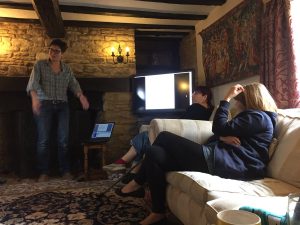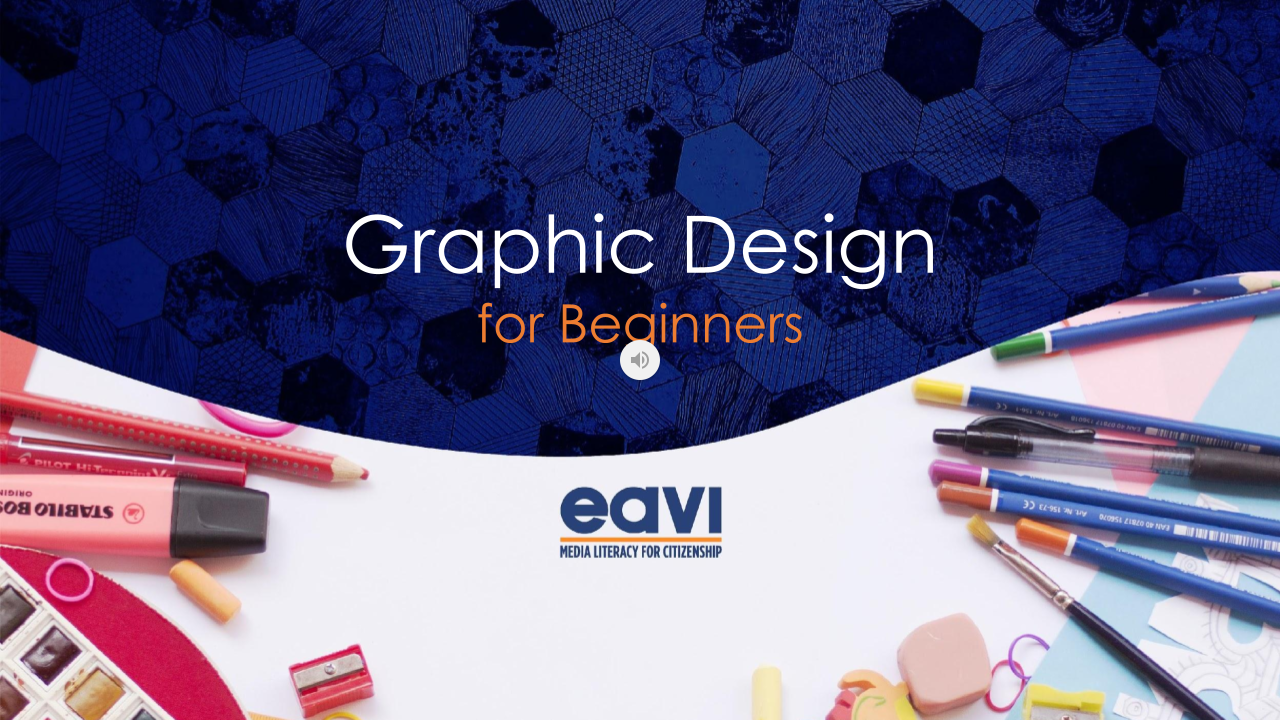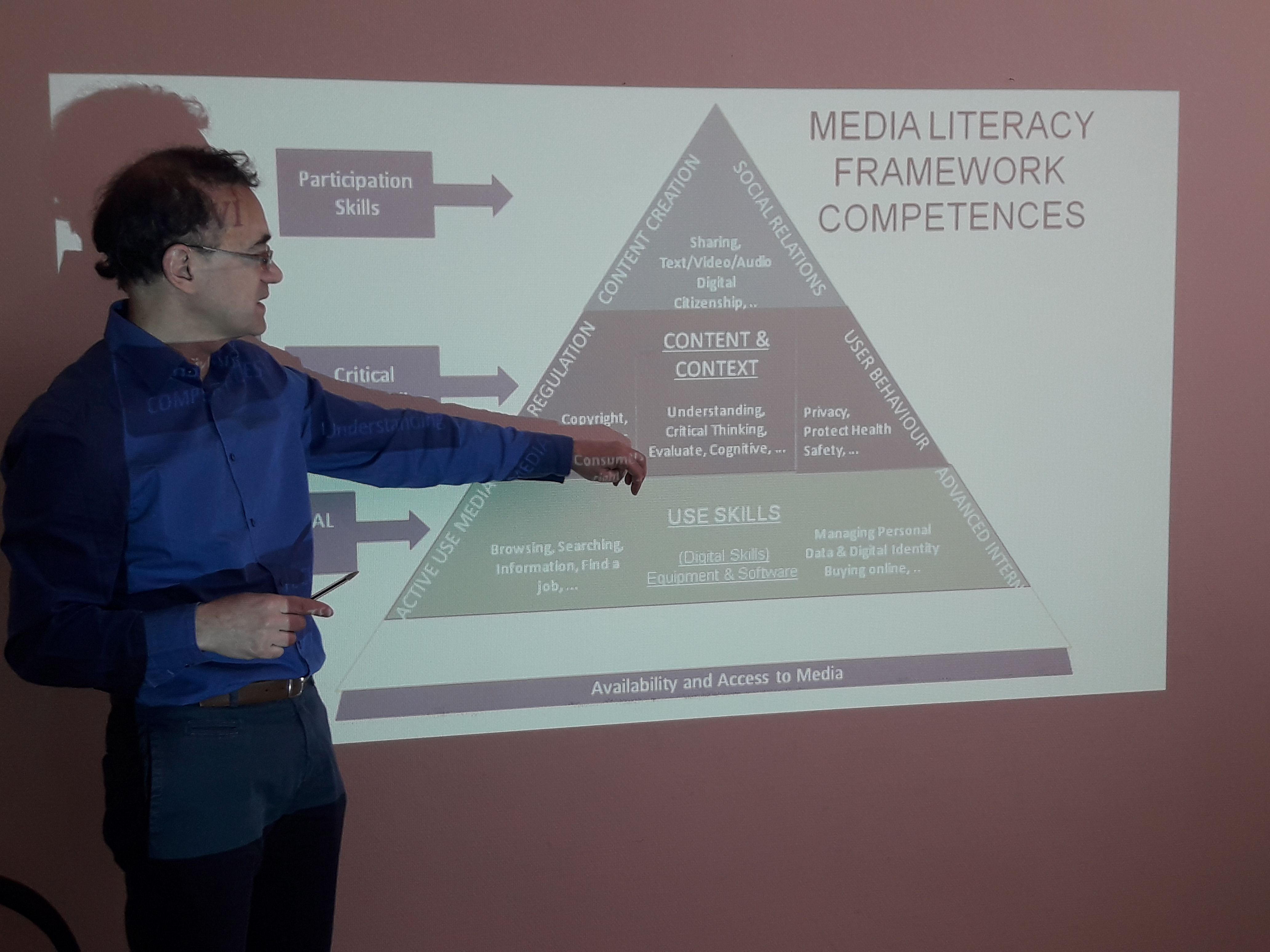
On 22 September, EAVI attended the 2018 Autistic Women’s Retreat in Oxfordshire, UK to hold a workshop on media literacy for 15 participants – all autistic women from Britain, USA and Sweden. The workshop focused on media literacy concepts, and specific issues facing autistic women in their relationship with the media, both in terms of representation and participation.
The workshop opened with an introduction to media literacy, using EAVI’s tried and tested six questions and three examples formula, three media messages were broken down and analysed by way of example. As the last media message was a social media post, this led neatly onto a discussion about how we present ourselves on social media, with the participants engaged in lively discussion about the way they presented themselves on social media, and their brand.
We then moved on to looking at how media presents a small, misleading snapshot of reality. This was linked back to issues important to the group, by looking at how autism is represented in the media – either high-impact, poorly functioning individuals who are a burden on their families, or genius savants with odd habits and poor interpersonal skills.
The two concepts, of personal brands on social media, and representation in the media, were then linked to discuss how they, as autistic women, can best challenge the representation of their community in the media, by making their presence on social media felt. We discussed strategy, personal safety and healthy behaviours in online activism, as well as successful strategies that could be employed in raising awareness and acceptance of autism in all its forms, especially for women who often feel maligned in the narrative.
Finally, we finished on our profile game, where participants are given five data points for five profiles (an online purchase, a google search, an online video, a photo and a social media post), and they were asked to guess the age, gender, family status, educational attainment and political leaning of the individual. All the groups were spot on in their guesses. We then paired their individual with conspiracy theories they were most likely to believe.
It was a very successful workshop (taking place at the Cotswold Manor and so was quickly dubbed “Living Room Lectures”), the participants were engaged, informed and ready to learn and have fun with the subject, while moving forward in their media lives more empowered to represent themselves and their community and create a more inclusive narrative of autism.
Feedback:
“I thought it was highly informative, a real eye opener and left me with lots to think about.”
‘’ I attended a workshop presented by Naomi Thompson on Media Literacy and I have to say that I found it incredibly informative and eye opening regarding our online presence, brand and how we present ourselves. It was astounding how common misleading news articles are and this workshop excelled in teaching us the tools in which to recogonise them. Naomi presented the information in a manner that was very easy to understand as well as making it a thoroughly enjoyable experience. I would highly recommend that everyone should attend this course as the information imparted was crucial to protecting yourself online and understanding the vast array of media that we encounter everyday. It was a genuine pleasure to attend. ‘’
‘’So this weekend I had the pleasure of attending one of Naomi’s presentations on media literacy. It’s a topic I’ve never really thought about much. I get the junk emails, but I wasn’t quite so aware of junk posts and what this can lead to. As a mum with young children’s this is not a major concern yet, but I am aware there will come a time very soon they will know far more than me about the internet and social media. As an autistic woman I tend to take things at face value, so I have taken from the workshop, to challenge my thinking a bit more. I would be keen to send my children to a talk/workshop about this too when they are a little older and I would like to learn more myself. It’s very easy to be so naive about what the media portray, we only see a snap shot and we only challenge what we want to.’’

On 22 September, EAVI attended the 2018 Autistic Women’s Retreat in Oxfordshire, UK to hold a workshop on media literacy for 15 participants – all autistic women from Britain, USA and Sweden. The workshop focused on media literacy concepts, and specific issues facing autistic women in their relationship with the media, both in terms of representation and participation.
The workshop opened with an introduction to media literacy, using EAVI’s tried and tested six questions and three examples formula, three media messages were broken down and analysed by way of example. As the last media message was a social media post, this led neatly onto a discussion about how we present ourselves on social media, with the participants engaged in lively discussion about the way they presented themselves on social media, and their brand.
We then moved on to looking at how media presents a small, misleading snapshot of reality. This was linked back to issues important to the group, by looking at how autism is represented in the media – either high-impact, poorly functioning individuals who are a burden on their families, or genius savants with odd habits and poor interpersonal skills.
The two concepts, of personal brands on social media, and representation in the media, were then linked to discuss how they, as autistic women, can best challenge the representation of their community in the media, by making their presence on social media felt. We discussed strategy, personal safety and healthy behaviours in online activism, as well as successful strategies that could be employed in raising awareness and acceptance of autism in all its forms, especially for women who often feel maligned in the narrative.
Finally, we finished on our profile game, where participants are given five data points for five profiles (an online purchase, a google search, an online video, a photo and a social media post), and they were asked to guess the age, gender, family status, educational attainment and political leaning of the individual. All the groups were spot on in their guesses. We then paired their individual with conspiracy theories they were most likely to believe.
It was a very successful workshop (taking place at the Cotswold Manor and so was quickly dubbed “Living Room Lectures”), the participants were engaged, informed and ready to learn and have fun with the subject, while moving forward in their media lives more empowered to represent themselves and their community and create a more inclusive narrative of autism.
Feedback:
“I thought it was highly informative, a real eye opener and left me with lots to think about.”
‘’ I attended a workshop presented by Naomi Thompson on Media Literacy and I have to say that I found it incredibly informative and eye opening regarding our online presence, brand and how we present ourselves. It was astounding how common misleading news articles are and this workshop excelled in teaching us the tools in which to recogonise them. Naomi presented the information in a manner that was very easy to understand as well as making it a thoroughly enjoyable experience. I would highly recommend that everyone should attend this course as the information imparted was crucial to protecting yourself online and understanding the vast array of media that we encounter everyday. It was a genuine pleasure to attend. ‘’
‘’So this weekend I had the pleasure of attending one of Naomi’s presentations on media literacy. It’s a topic I’ve never really thought about much. I get the junk emails, but I wasn’t quite so aware of junk posts and what this can lead to. As a mum with young children’s this is not a major concern yet, but I am aware there will come a time very soon they will know far more than me about the internet and social media. As an autistic woman I tend to take things at face value, so I have taken from the workshop, to challenge my thinking a bit more. I would be keen to send my children to a talk/workshop about this too when they are a little older and I would like to learn more myself. It’s very easy to be so naive about what the media portray, we only see a snap shot and we only challenge what we want to.’’

On 22 September, EAVI attended the 2018 Autistic Women’s Retreat in Oxfordshire, UK to hold a workshop on media literacy for 15 participants – all autistic women from Britain, USA and Sweden. The workshop focused on media literacy concepts, and specific issues facing autistic women in their relationship with the media, both in terms of representation and participation.
The workshop opened with an introduction to media literacy, using EAVI’s tried and tested six questions and three examples formula, three media messages were broken down and analysed by way of example. As the last media message was a social media post, this led neatly onto a discussion about how we present ourselves on social media, with the participants engaged in lively discussion about the way they presented themselves on social media, and their brand.
We then moved on to looking at how media presents a small, misleading snapshot of reality. This was linked back to issues important to the group, by looking at how autism is represented in the media – either high-impact, poorly functioning individuals who are a burden on their families, or genius savants with odd habits and poor interpersonal skills.
The two concepts, of personal brands on social media, and representation in the media, were then linked to discuss how they, as autistic women, can best challenge the representation of their community in the media, by making their presence on social media felt. We discussed strategy, personal safety and healthy behaviours in online activism, as well as successful strategies that could be employed in raising awareness and acceptance of autism in all its forms, especially for women who often feel maligned in the narrative.
Finally, we finished on our profile game, where participants are given five data points for five profiles (an online purchase, a google search, an online video, a photo and a social media post), and they were asked to guess the age, gender, family status, educational attainment and political leaning of the individual. All the groups were spot on in their guesses. We then paired their individual with conspiracy theories they were most likely to believe.
It was a very successful workshop (taking place at the Cotswold Manor and so was quickly dubbed “Living Room Lectures”), the participants were engaged, informed and ready to learn and have fun with the subject, while moving forward in their media lives more empowered to represent themselves and their community and create a more inclusive narrative of autism.
Feedback:
“I thought it was highly informative, a real eye opener and left me with lots to think about.”
‘’ I attended a workshop presented by Naomi Thompson on Media Literacy and I have to say that I found it incredibly informative and eye opening regarding our online presence, brand and how we present ourselves. It was astounding how common misleading news articles are and this workshop excelled in teaching us the tools in which to recogonise them. Naomi presented the information in a manner that was very easy to understand as well as making it a thoroughly enjoyable experience. I would highly recommend that everyone should attend this course as the information imparted was crucial to protecting yourself online and understanding the vast array of media that we encounter everyday. It was a genuine pleasure to attend. ‘’
‘’So this weekend I had the pleasure of attending one of Naomi’s presentations on media literacy. It’s a topic I’ve never really thought about much. I get the junk emails, but I wasn’t quite so aware of junk posts and what this can lead to. As a mum with young children’s this is not a major concern yet, but I am aware there will come a time very soon they will know far more than me about the internet and social media. As an autistic woman I tend to take things at face value, so I have taken from the workshop, to challenge my thinking a bit more. I would be keen to send my children to a talk/workshop about this too when they are a little older and I would like to learn more myself. It’s very easy to be so naive about what the media portray, we only see a snap shot and we only challenge what we want to.’’






















































































































































